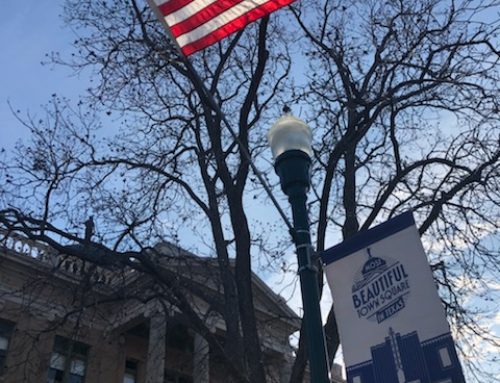Bear with me if you want to make a few extra hundred thousand dollars, yeah, you heard me! I may wander in to the weeds of commercial real estate terminology a bit, but it’s all for a good cause, your retirement and your pocket book!
I’m one of the rare real estate agents/brokers that does a fair bit of business in both commercial and residential real estate. I enjoy the change of pace and different mindset that comes along with each type of business. Because of this, I spend a lot of time explaining to residential clients who ask about investments why they should consider commercial investment property rather than single family rental investments (I will write a blog post about that soon, too, btw). Recently, I had an epiphany of sorts (at least in my tiny brain), so I want to share it with my commercial clients (or anyone) who own *and* occupy their property today.
Think about a dentist, orthodontist, doctor, attorney, chiropractor, CPA, etc that runs their business out of a property they own. Fantastic! Great! Stupendous! This is a very forward-thinking and fiscally responsible investment vehicle for retirement. But wait, you have to retire! And, when you retire, what are you going to do with that property? Really you have two options. Sell it when you retire or lease it out to someone else. Either way, you gotta do something since you’re no longer operating your business in the property you were occupying. If you’re going to lease it out, you can quit reading and go back to planning your next golf outing or wine tasting.
If, however, you want to sell your property when you retire, as most do, you’ll be interested in what follows. The typical owner will pour their time, energy, passion, and thoughts in to their trade/business and assume that when they stop doing that trade they will just sell the property and reap the rewards of their grand investment. By and large, they will, and they will do well. I believe, however, there is a slightly different approach that will potentially help them to realize a significant amount of money…to the tune of hundreds of thousands of dollars.
Here’s where I go in to the weeds…so I apologize in advance, but/and you can thank me later in the form of commission by hiring me.
Commercial properties are generally valued on their ability to make money. This is also referred to as their “capitalization rate” or “cap rate” as us cool people in the “biz” call it. The cap rate is calculated by dividing the amount of “net operating income” (i.e. “NOI”) the property produces/yields by the “value” of the property (i.e. sales price). A reasonable cap rate is seen differently by sellers and buyers, sort of an inverse relationship. Sellers want to sell their property at a lower cap (~6%) rate since that means the value is higher, whereas a buyer wants to buy a property with a higher cap rate (~7%+) since that means they are getting a better deal (i.e. price/value). Properties in better condition with strong leases in place can demand a lower cap rate since they are more stable, while properties that need more work and/or need better leases in place (i.e. value add properties) will realize higher cap rates, since the buyer is likely going to be exposed to more risk (lost rents, improvements, etc). Investors/buyers will also look at buying properties with leases in place before looking at properties that are more speculative, since there is a more predictable and proven return on investment already in place…i.e. a turn-key investment.
Which brings me to the scenario I laid out at the onset of the post. Our small business professional is retiring, time to sell the business and/or property. Property is listed at a rate your broker deems appropriate either based on comps of new builds or via a cap rate model. Either way, you don’t have a tenant already in place and the value is speculative to an investor/buyer. What happens? You wait. Your broker seeks buyers, you lower the price, you seek more buyers, but, by and large, they want an already proven investment.
To put this in to numbers, let’s discuss our two models. A new 5,000 square foot office building will cost anywhere from $250-$300/sf…and 1.5-2 years to build, thanks to the red tape that comes along with the development process. That puts us somewhere in the $1.25 – $1.5 MM range. If we are competing with these types of developments, expect to sell for less since we aren’t shiny and new, plus we have that issue of no tenant/immediate ROI. Not bad, though, still a good chunk of change! But wait, there’s more!
Now lets look at the same property if we have a tenant in place. The tenant pays, lets say, $25/sf (with triple net fees, aka “NNN” on top). That will yield a NOI (roughly) of $125,000/year. Divide that by a decent cap rate of 7% and we are looking at a sales price of nearly $1,800,000!!!! Yes, I had to use algebra there to divide the NOI by the cap rate to back in to the sales price…and they said I’d never use algebra again! And yes, you saw the numbers right. With a tenant in place, you can realize a LOT more money on a property sale than selling as a speculative property.
But, where to find a quality tenant that can bolster the property value when you retire?? Look in the mirror! You are your own best tenant. Confused? Good, but here’s how it works. 3-5 years BEFORE retirement, Dr. Owner/Mrs. Attorney/Ms. CPA (i.e. you) will sign a lease with your own business at a market lease rate. They then market the property as an investment with a quality tenant in place for the next 3-5 years. The property is immediately attractive to the buyer/investor community. They see the property now as a solid investment and not a speculative deal, and they have 3-5 years to find a replacement tenant. So, while you will be leasing the property after you sell (prior to retirement), you’d saved/made a considerable amount more and you don’t have the heartache and burden of the selling the property as a speculative investment at or after retirement. Instead, you’ll be counting Benjamins on the beach sipping Mai Tais once your lease expires and you finally retire!
Pretty much, I’m a genius, click here to get the ball rolling on making your retirement plans: https://funk.com/contact-us/!





Leave A Comment